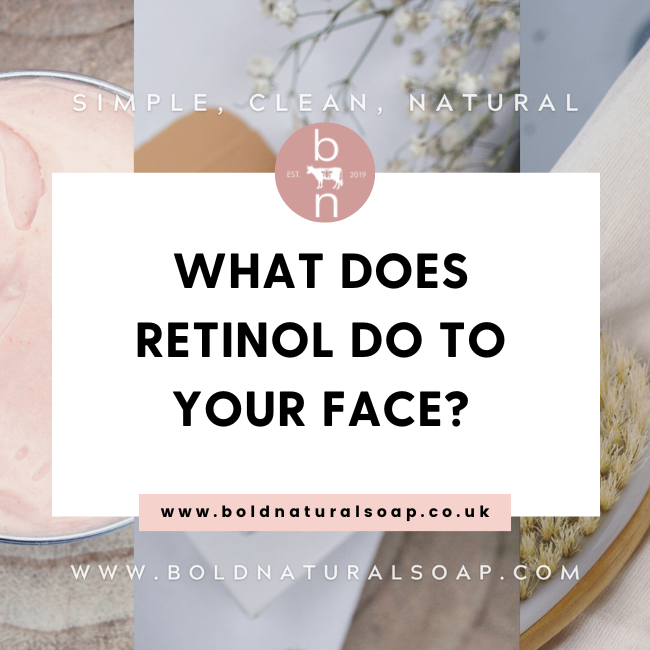Retinol is a powerful ingredient in many skincare products that can help reduce fine lines, wrinkles, and other signs of aging. It is a derivative of vitamin A and is known for its ability to boost collagen production and speed up cell turnover, giving you smoother, firmer, and younger-looking skin. However, retinol can also cause skin irritation, dryness, and sensitivity, especially if you have sensitive or acne-prone skin. If you are looking for a natural alternative to retinol, there are several options that you can consider.

First, let's take a closer look at what retinol does to your face and how it works. Retinol works by stimulating the production of new skin cells and increasing collagen production, which can help to reduce the appearance of fine lines and wrinkles. It also helps to unclog pores, reduce inflammation, and regulate sebum production, making it a popular ingredient in acne treatments. However, retinol can also cause skin irritation, redness, and dryness, especially when used in high concentrations or in combination with other harsh ingredients.

If you are looking for a natural alternative to retinol, there are several ingredients that you can consider. Here are some of the best natural alternatives to retinol:
-
Bakuchiol: Bakuchiol is a natural compound found in the seeds and leaves of the babchi plant. It has been shown to have anti-aging properties similar to retinol, but without the potential side effects. Bakuchiol has been shown to increase collagen production, reduce the appearance of fine lines and wrinkles, and improve skin elasticity and firmness.
-
Rosehip oil: Rosehip oil is rich in vitamins A, C, and E, which are all important for healthy skin. It also contains antioxidants that can help to protect your skin from environmental damage. Rosehip oil is known for its ability to reduce the appearance of fine lines and wrinkles, fade scars and hyperpigmentation, and improve overall skin texture and tone.
-
Green tea extract: Green tea extract is a powerful antioxidant that can help to protect your skin from damage caused by free radicals. It also has anti-inflammatory properties that can help to reduce redness and irritation. Green tea extract has been shown to improve skin elasticity, reduce the appearance of fine lines and wrinkles, and improve overall skin texture and tone.
-
Vitamin C: Vitamin C is an essential nutrient for healthy skin, and it is also a potent antioxidant. It can help to brighten your skin, reduce the appearance of fine lines and wrinkles, and improve overall skin texture and tone. Vitamin C can be found in many natural skincare products, including serums, moisturizers, and masks.
-
Aloe vera: Aloe vera is a natural moisturizer that can help to soothe and hydrate your skin. It also has anti-inflammatory properties that can help to reduce redness and irritation. Aloe vera has been shown to improve overall skin texture and tone, and it is gentle enough to use on even the most sensitive skin.
In conclusion, retinol can be a powerful ingredient in your skincare routine, but it can also cause skin irritation and sensitivity. If you are looking for a natural alternative to retinol, there are several options that you can consider. Bakuchiol, rosehip oil, green tea extract, vitamin C, and aloe vera are all great natural alternatives that can help to improve the appearance of your skin without the potential side effects of retinol.
Blog Cheat Sheet

Did you know
Some of our best Selling Face butters contain Natural alternatives to Retinol
Aloe Whipped Face butter - Contains Aloe vera and Prickly pear which helps restore elasticity. It promotes brighter and more even-toned skin. Prickly pear is extremely high in essential fatty acids, omega-6 and -9, and the natural antioxidant vitamin E. It’s also rich in amino acids, which stimulate collagen production to promote faster cell turnover. And finally, it also contains vitamin K, which brightens under-eye dark circles and also promotes your skin’s elasticity.
Rose Whipped Face butter - Contains Carrot Seed and Argan Oil also a powerful natural retinol alternatives as it is naturally rich in beta-carotene (provitamin A). Argan Oil is a complex blend of nutrients. Essential fatty acids, Vitamin E, Ursolic Acid, Carotenoids, Polyphenols, Ferulic Acid, phytosterol and Squalene. All of which are active in maintaining healthy skin cell growth. It boosts Collagen levels firming skin naturally.
Lavender Whipped Face butter - Rosehip oil is extremely rich in the essential fatty acids oleic, gamma linolenic acid, linoleic as well as vitamin C and Frankincense Oil encourages the growth of new cells. It also addresses age spots, evens out the skin tone and boosts skin elasticity all while tightening the skin.

